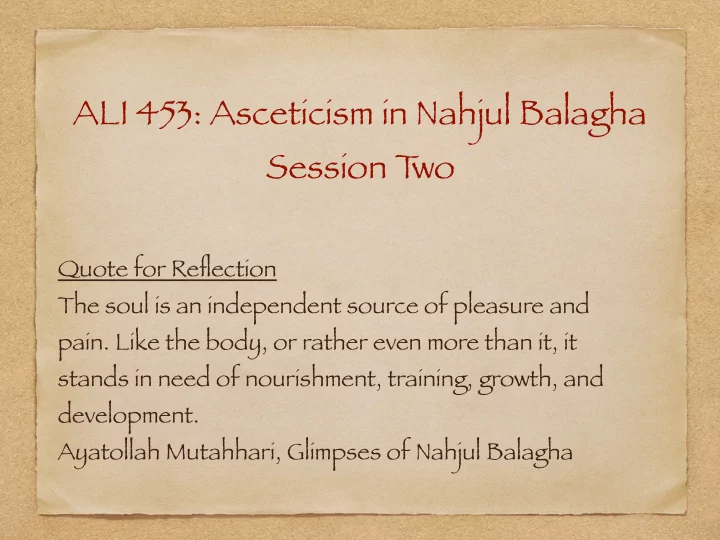

ALI 453: Asceticism in Nahjul Balagha Session T wo Quote for Reflection The soul is an independent source of pleasure and pain. Like the body, or rather even more than it, it stands in need of nourishment, training, growth, and development. Ayatollah Mutahhari, Glimpses of Nahjul Balagha
Agenda Understanding Zuhd Quran and Hadith on Zuhd Zuhd and Monasticism Altruism
What is Zuhd? Spiritual and Intellectual indifference to natural objects of desire. The goal of the Zahid is above normal aims and pleasures. It may be the pleasures of the Hereafter, ethical and moral ideals, or spiritual elevation. Zuhd is manifested in practical life through simplicity, contentment and restraining from indulgence.
ْﻢُﻛﺎَﺗآ ﺎَﻤِﺑ اﻮُﺣَﺮْﻔَﺗ ﺎَﻟَو ْﻢُﻜَﺗﺎَﻓ ﺎَﻣ ﲐَﻠَﻋ اْﻮَﺳٔﺎَﺗ ﺎَﻠْﻴَﮑِﻟ ۗ ٍرﻮُﺨَﻓ ٍلﺎَﺘْﺨُﻣ ﱠﻞُﻛ ﱡﺐِﺤُﻳ ﺎَﻟ ُﻪﱠﻠﻟاَو So that you may not grieve for what has escaped you, nor be exultant at what He has given you; and Allah does not love any arrogant boaster Sura Hadid, no.57, verse 23
Zuhd and Monasticism Monasticism is the renunciation of the world. It includes separation from society and dedication to spiritual work. Zuhd is to live in society but be indifferent to material desires and goals. Zuhd entails social responsibility. Monasticism separates between the world and the Hereafter while Zuhd sees both as connected.
Ithar - Altruism Altruism is to prefer others over yourself The zahid is hard upon himself so that others may live in ease. He derives greater satisfaction by feeding and clothing others and working for their ease than if he did those things for himself
Quran on Altruism And those who made their abode in the city and in the faith before them love those who have fled to them, and do not find in their hearts a need of what they are given, and prefer them over themselves though poverty may afflict them, and whoever is preserved from the miserliness of his soul, they are the successful ones. Sura Hashr, no.59, verse 9
Question for Discussion 1)When do actions of this world become other worldly? 2) What are some differences between the Zahid and the monk? 3) How does a Zahid react to the misery in society due to the oppressive practices of human beings?
Recommend
More recommend